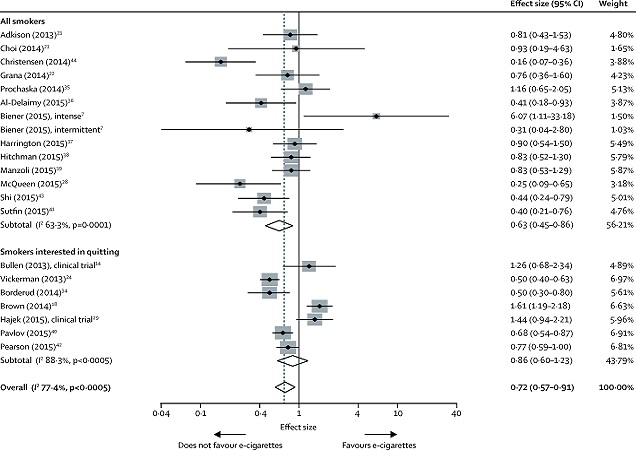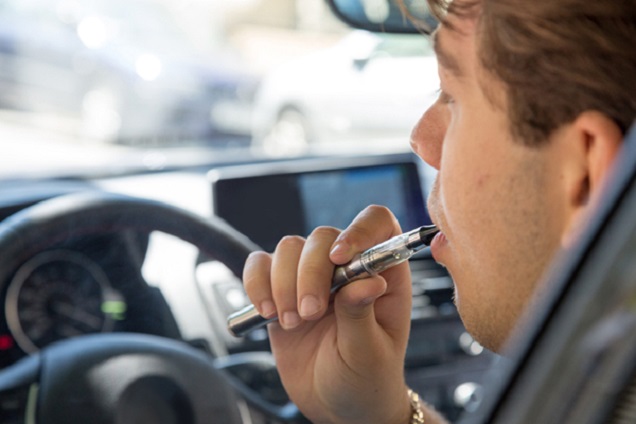
Vaping makes you too drunk to drive safely, reduces your chances of quitting smoking, should be banned outdoors, shouldn’t be allowed on college campuses and is grounds for not hiring somebody, if you believe the news this week. Thankfully, there’s a smattering of good news and excellent blog posts to break up the constant onslaught of absurd claims. In other words, it’s exactly what you’d expect from the Week in Vaping.
E-Cigarette Research
Stanton Glantz has tried to do some science again, and has failed again. His paper is a meta-analysis of studies addressing whether vaping helps smokers quit, and he concludes that they don’t. How did he manage to come to the opposite conclusion to the Cochrane researchers who also looked at the evidence? Through his usual mixture of incompetence, misrepresentation of studies and pre-existing bias, of course!

The meta-analysis was torn to pieces immediately by experts at the Science Media Centre, and Clive Bates and Carl V. Phillips both have excellent blog posts that offer insight into the numerous problems with the paper. The upshot is that the paper includes many pieces of research which only asked about vaping at the start of the study, and took either “ever vaped” or “vaped more than one day in the past month” as the definition for the “e-cigarette” group. The only problem is: to be included in the study, they had to still be smoking.
Professor Peter Hajek hit the nail on the head with an excellent analogy:
Imagine you recruit people who absolutely cannot play piano. There will be some among them who had one piano lesson in the past. People who acquired any skills at all are not in the sample, only those that were hopeless at it are included. You compare musical ability in those who did and those who did not take a lesson, find a difference, and report that taking piano lessons harms your musical ability. The reason for your finding is that all those whose skills improved due to the lessons are not in the sample, but it would not necessarily be obvious to readers.
Combining several studies that make this type of mistake and similar ones does not result in a reliable meta-analysis, and the differences in design between the individual studies also presents big issues for combining the results.
Stanton Glantz tried to respond to the barrage of criticism, but failed pretty miserably, repeating the same tangential points over and over again. Carl V. Phillips responded to his response, too. Meanwhile, Australian anti-vaping academic Simon Chapman accepts the study’s conclusion completely uncritically in a blog on the Conversation.
A new study from Dr. Konstantinos Farsalinos has looked at how completely switching to vaping or cutting down on smoking by 50% or more impacts blood pressure. The results showed that while the group as a whole didn’t show changes in blood pressure (because most had normal blood pressure at the start of the study), those with high blood pressure at the start who either quit smoking entirely or cut down by half saw a significant reduction in blood pressure, with a bigger reduction in those quitting entirely. This is another finding that supports the idea that smokers switching to vaping see big health benefits.
Another new study with Dr. Farsalinos as lead author, but coming from the Tennessee Smoke Free Association, has found that tank-type atomizers offer more consistent nicotine delivery than cartomizers. This shows that the FDA’s proposed regulation would take vaping technology back to a time when nicotine delivery was much more inconsistent.
A study from last week found that e-cigarettes deliver enough nicotine to suppress the desire to smoke and have a similar safety profile to Nicorette NRT products. The two-part study is available to read here and here.
Another study from last week has found that smokers who quit by vaping are more likely to avoid the weight gain that often results when you quit smoking.
In a study that should come as a surprise to absolutely nobody but doomsday scenario anti-e-cig evangelists, researchers have found that e-cigarette ads don’t make teens more interested in smoking tobacco. You know, like how advertisements for DVDs and Blu-rays don’t increase the appeal of VHS, or how alcohol advertisements don't make people want to drink hand sanitizer or rubbing alcohol.
Tom Preun has also published a great blog post about the recent “e-cigs cause cancer” scare, if you missed the widespread debunking of it towards the end of last year.
Regulations, Legislation and Vaping Bans
California assemblyman Kevin McCarthy has proposed banning smoking and vaping on all college campuses, with fines of up to $100 suggested for students who break the rules.
A horrendous piece of legislation in Miami Beach, Florida proposes allowing the city to deny employment to anyone who uses nicotine – again, not anyone who smoke, anyone who uses nicotine. CASAA rightfully calls this discriminatory.
Eudora in Douglas County, Colorado has banned vaping in the city’s parks (because the blatant lack of risk doesn’t stop anyone from curtailing freedom) along with in public access buildings.
CASAA’s survey of their members was published at the beginning of last week, showing that over 90 % of respondents would go to the black market if a ban or a de facto ban (which the current proposal effectively is) on most products was brought in.
There’s a useful explainer of the FDA’s deeming rule for e-cigarettes by Patricia Kovacekic of Nicopure, if you’re unsure as to what’s actually being put forward for vaping products in the US.
There’s a petition in Germany about the impending implementation of the EU Tobacco Products Directive for vaping products, with information and instructions for signing it – which anyone can do, regardless of where they live – here.
Congress has passed legislation requiring child-proof packaging for e-liquids. This is something pretty much everyone favors, but it couldn’t be passed without some excessive statements like this making their way into the news: “A few drops of this stuff can cause a child to become extremely ill.”
Vaping News, Blog Posts and Other Stuff
Lorien Jollye has published a new blog post talking about advocacy, the difficulties of communicating complex issues on Twitter and medical e-cigarettes – very much taking an open attitude to the option for smokers who want the additional reassurance of medical approval. It’s an excellent and thought-provoking read, as always from Lorien, and there are Philip K. Dick and Monty Python references thrown in for good measure.

Brad Rodu has an interesting post up entitled Bootleggers, Baptists and E-Cigarettes – after a recent paper of the same name – talking about the unholy, unspoken coalition between the Baptists (i.e. the public health moralists opposed to e-cigarettes on puritanical grounds) and the bootleggers, in this case cigarette companies, pharmaceutical companies and state governments dependent on tobacco tax revenue.
E-Cigarette Direct has a giveaway running for three Aspire Tritons, which is running until the 25th of January. We also have a giveaway running for three UD Balrog kits.
If you’ve been waiting on the edge of your seat for the release of a smartphone you can use to vape, it’s finally here. It’s gotten a lot of coverage this last week, but it’s obviously more of a gimmick than anything (unless you don't mind draining the battery life for your e-cig and your cell phone at the same time).
Bullshit of the Week – E-Cigarette Cause Car Crashes

A study which Michael Siegel drew attention to this week shows just how little justification people need for opposing vaping. The researchers found that alcohol-containing e-cigarettes don’t lead to detectable quantities of alcohol in the blood, but then took it upon themselves to conclude:
Because alcohol disrupts many psychomotor functions, including those impacting driving performance, dose-dependently with blood alcohol concentrations just above zero, individuals using e-liquids with high alcohol content under ordinary circumstances may be at increased risk of accidents.
The problems with this study and its conclusion are legion, but you don’t even really need to delve into the details to see through this thinly-veiled propaganda. Nobody feels drunk after vaping. Why you’d expect that this non-drunkenness could impair your coordination enough to put you at increased risk of accidents is utterly baffling.
Not only was there no detectable blood alcohol after vaping, the study actually found an improvement in motor coordination after vaping, just a slightly smaller one in those vaping higher-alcohol liquids.
You still shouldn’t drip and drive, but the idea that vaping actually impairs your driving ability is bullshit of the highest order.
Check Back Next Week for More!
So that’s it for this week. If we missed any important, interesting or funny stories, let us know in the comments!

